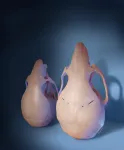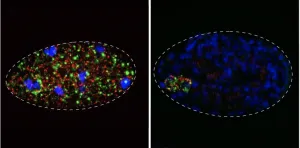Paper: Emotionally appealing ads may not always help consumer memory
2021-01-07
(Press-News.org) CHAMPAIGN, Ill. -- In almost all successful advertising campaigns, an appeal to emotion sparks a call-to-action that motivates viewers to become consumers. But according to research from a University of Illinois Urbana-Champaign expert who studies consumer information-processing and memory, emotionally arousing advertisements may not always help improve consumers' immediate memory.
A new paper co-written by Hayden Noel, a clinical associate professor of business administration at the Gies College of Business at Illinois, finds that an ad's emotional arousal can have a negative effect on immediate memory but a positive effect on delayed memory - but only if the level of emotional arousal elicited by the ad is congruent with the ad's claims.
"Emotionally arousing appeals have long been used in advertising, but the impact of those appeals on consumers' memory has always been a bit unclear," Noel said. "So we examined the impact of different aspects of emotionally arousing ads on memory. Why did we focus on emotion? Well, in the majority of business-to-consumer ads that are crafted to drive sales, eliciting emotional activation, or arousal, plays a critical role."
In three experiments using print and video ads from different English-speaking countries, Noel and co-author Hila Riemer of Ben Gurion University of the Negev tested the moderating roles of retention time and the fit between the emotional arousal communicated in the ad and the ad claim. All experiments used combinations of low- and high-emotionally arousing ads.
The researchers found that when the level of emotional activation elicited by the ad doesn't fit the ad's claim, then the message conveyed ultimately doesn't stick in the consumer's mind.
"It's an examination of boundary conditions under which you can maximize the use of emotional appeals," Noel said. "And the role of retention time shows that low-arousal stimuli are better remembered in the short term, but high-arousal stimuli are better in the long term. But if the emotional arousal doesn't match with the ad's claim - if you're trying to promote the idea of a relaxing vacation with images of activity - then there's no effect. Ultimately, advertisers should use emotionally arousing messages only if they are interested in improving consumers' long-term memory of the ad, and avoid such messages if the goal is to enhance their short-term memory of the ad and its claims."
Emotional appeals continue to be essential tools for marketers, and emotionally arousing ads are generally the most successful type of advertisement, "leading to higher levels of profit relative to other ads that may appeal to intellect or rational thought," Noel said.
"Ads that pump up the emotional content really move the needle," he said. "Advertisers know that for an ad to be effective, it needs to be memorable, which accounts for how often they use high-intensity appeals. But over time, that's problematic. Creatives tend to fall in love with the quirky and funny ads that otherwise have little to do with the claims the ad is making. So emotionally arousing advertisements may not always be helpful or provide an advantage in remembering the ad's content.
"You don't want creatives to ignore fit or relevance at the expense of the emotion."
Noel said the research has practical implications for advertisers and marketers interested in developing suitable message strategies under various circumstances.
"In 2019, $239 billion was spent on advertising," he said. "In election years, we typically see an increase in advertising, but COVID-19 will put a damper on 2020's final tally. However, advertising will continue to be a very large and important industry in the U.S., which is home to some of the largest advertising spenders on the planet, as well as consumers who are routinely exposed to extensive advertising campaigns.
"All of those factors make it even more critical now to ensure advertising effectiveness, given that the market and budgets have shrunk so much because of the pandemic."
INFORMATION:
The paper was published in the International Journal of Advertising.
[Attachments] See images for this press release:

ELSE PRESS RELEASES FROM THIS DATE:
2021-01-07
Using stem cells to regenerate parts of the skull, scientists corrected skull shape and reversed learning and memory deficits in young mice with craniosynostosis, a condition estimated to affect 1 in every 2,500 infants born in the United States, according to the Centers for Disease Control and Prevention. The only current therapy is complex surgery within the first year of life, but skull defects often return afterward. The study, supported by the National Institute of Dental and Craniofacial Research (NIDCR), could pave the way for more effective and less invasive therapies for children with craniosynostosis. ...
2021-01-07
Humans feeding leftover lean meat to wolves during harsh winters may have had a role in the early domestication of dogs, towards the end of the last ice age (14,000 to 29,000 years ago), according to a study published in Scientific Reports.
Maria Lahtinen and colleagues used simple energy content calculations to estimate how much energy would have been left over by humans from the meat of species they may have hunted 14,000 to 29,000 years that were also typical wolf prey species, such as horses, moose and deer. The authors hypothesized that if wolves and humans had hunted the same animals during harsh winters, humans would have killed wolves to reduce competition rather than domesticate them. With the exception of Mustelids such as weasels, ...
2021-01-07
"Nature red in tooth and claw" - The battle to survive is fought down to the level of our genes. Toxin-antidote elements are gene pairs that spread in populations by killing non-carriers. Now, research by the Burga lab at IMBA and the Kruglyak lab at the University of California, Los Angeles shows that these elements are more common in nature than first thought and have evolved a wide range of mechanisms to force their inheritance and propagate in populations - a parasite within the genome.
Originally described in the model nematode Caenorhabditis elegans, toxin-antidote elements consist of two linked genes, a toxin and its antidote. While the toxin is loaded into eggs by mothers, only embryos that inherit the element express the antidote. Thus, the ...
2021-01-07
The National Human Genome Research Institute (NHGRI) within the National Institutes of Health (NIH) has released a new action agenda for a diverse genomics workforce. This ambitious set of goals, objectives, and implementation strategies details NHGRI's plans for enhancing the diversity of the genomics workforce by 2030.
"To reach its full potential, the field of genomics requires a workforce that better reflects the diversity of the U.S. population," NHGRI Director Eric Green, M.D., Ph.D., said. "Fostering an appropriately diverse genomics workforce of the future requires an immediate and substantial commitment ...
2021-01-07
Noncognitive skills and cognitive abilities are both important contributors to educational attainment -- the number of years of formal schooling that a person completes -- and lead to success across the life course, according to a new study from an international team led by researchers at Columbia University Mailman School of Public Health, the University of Texas at Austin, and Vrije Universiteit Amsterdam. The research provides evidence for the idea that inheriting genes that affect things other than cognitive ability are important for understanding differences in people's life outcomes. Until now there had been questions about what these noncognitive skills are and how much they really matter for life outcomes. The new findings are published ...
2021-01-07
What The Study Did: Under a range of assumptions of presymptomatic transmission and transmission from individuals with infection who never develop symptoms, the model presented here estimated that more than half of transmission comes from asymptomatic individuals.
Author: Jay C. Butler, M.D., of the U.S. Centers for Disease Control and Prevention in Atlanta, is the corresponding author.
To access the embargoed study: Visit our For The Media website at this link https://media.jamanetwork.com/
(doi:10.1001/jamanetworkopen.2020.35057)
Editor's Note: The article includes funding/support disclosures. Please see the article for additional information, including other authors, author contributions and affiliations, conflict of interest and ...
2021-01-07
What The Study Did: Population data from Denmark were used to examine whether age at exposure to negative experiences in childhood and adolescence (parents' unemployment, incarceration, mental disorders, death and divorce, and the child's foster care experiences) was associated with outcomes in early adulthood.
Author: Signe Hald Andersen, Ph.D., of the Rockwool Foundation Research Unit in Copenhagen, Denmark, is the corresponding author.
To access the embargoed study: Visit our For The Media website at this link https://media.jamanetwork.com/
(doi:10.1001/jamanetworkopen.2020.32769)
Editor's Note: The article includes funding/support disclosures. Please see the article for additional information, including other authors, author contributions and affiliations, ...
2021-01-07
What The Study Did: To adapt to broader public health initiatives around COVID-19, researchers developed a drive-through intraocular pressure (IOP) screening clinic to minimize COVID-19 exposure for patients and clinicians by measuring eye pressure in the unconventional setting of a clinic parking lot.
Authors: Miel Sundararajan, M.D., of the University of California, San Francisco, is the corresponding author.
To access the embargoed study: Visit our For The Media website at this link https://media.jamanetwork.com/
(doi:10.1001/jamaophthalmol.2020.6073)
Editor's Note: The article includes conflict of interest and funding/support disclosures. Please see the article ...
2021-01-07
What The Study Did: Researchers compared changes in preoperative aided speech recognition with postoperative speech recognition among individuals who received cochlear implants.
Authors: Theodore R. McRackan, M.D., M.S.C.R., of the Medical University of South Carolina in Charleston, is the corresponding author.
To access the embargoed study: Visit our For The Media website at this link https://media.jamanetwork.com/
(doi:10.1001/jamaoto.2020.5094)
Editor's Note: The article includes conflicts of interest and funding/support disclosures. Please ...
2021-01-07
What The Study Did: The outcomes of a cancer center-wide virtual care program launched in response to the COVID-19 pandemic were examined in this study.
Authors: Alejandro Berlin, M.D., M.Sc., of the Princess Margaret Cancer Centre in Toronto, Ontario, Canada, is the corresponding author.
To access the embargoed study: Visit our For The Media website at this link https://media.jamanetwork.com/
(doi:10.1001/jamaoncol.2020.6982)
Editor's Note: The article includes conflict of interest and funding/support disclosures. Please see the article for additional information, including other authors, author contributions and affiliations, conflict ...
LAST 30 PRESS RELEASES:
[Press-News.org] Paper: Emotionally appealing ads may not always help consumer memory


